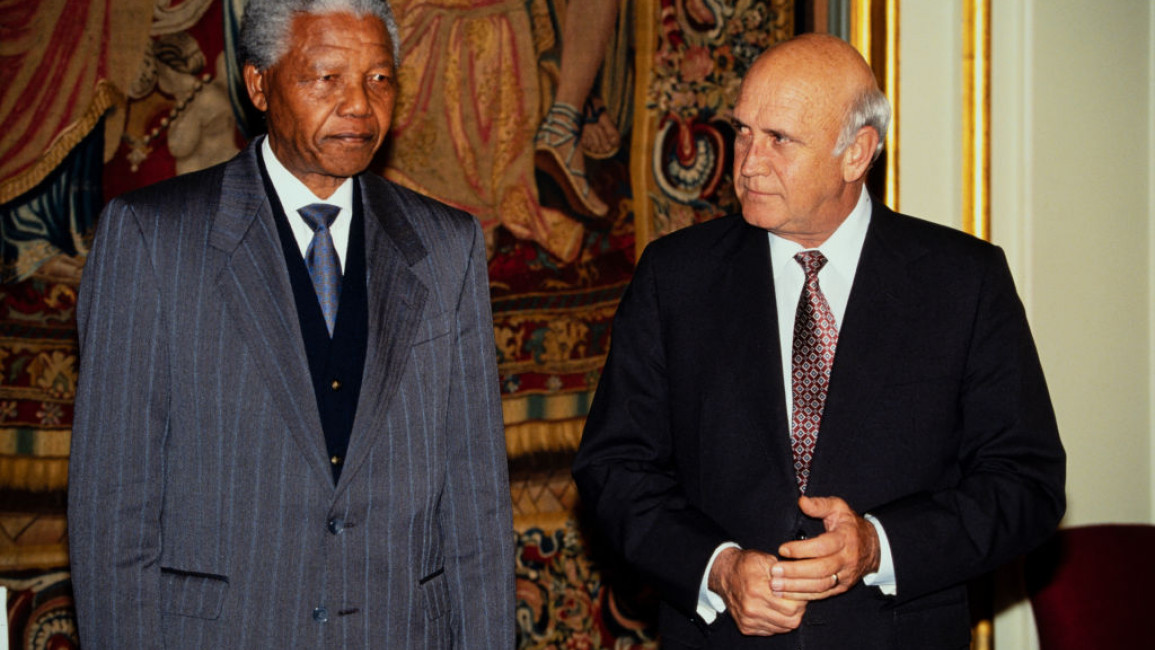South Africa's last apartheid president FW de Klerk dies aged 85
South Africa's last white president FW de Klerk died on Thursday at 85, with a legacy of helping steer the nation to democracy while never fully owning up to the horrors of the apartheid past.
He died at home early Thursday after a battle with cancer, his foundation said in a statement.
De Klerk freed Nelson Mandela from prison, unbanned political parties, and later shared a Nobel Peace Prize with the anti-apartheid icon.
Yet he never found a space in the democratic South Africa, and became seen as an apologist for the torture and killings committed by the segregationist regime.
His testimony had been demanded in several current cases seeking answers over past atrocities.
"De Klerk's legacy is a big one," the Nelson Mandela Foundation said in a statement. "It is also an uneven one, something South Africans are called to reckon with in this moment."
President Cyril Ramaphosa noted that De Klerk "played a vital role in our transition to democracy in the 1990s, which originated from his first meeting in 1989 with president Nelson Mandela who was a political prisoner at that stage.
"He took the courageous decision to unban political parties, release political prisoners and enter into negotiations with the liberation movement amid severe pressure to the contrary from many in his political constituency," Ramaphosa said in a statement.
The office of one of the harshest critics of apartheid, Archbishop Emeritus Desmond Tutu, said "the former president occupied an historic but difficult space in South Africa."
De Klerk's appearance before the Truth and Reconciliation Commission, which uncovered the atrocities of the white-minority regime, met with Tutu's chagrin.
At the time, Tutu expressed "disappointment that the former president had not made a more wholesome apology on behalf of the National Party to the nation for the evils of apartheid," his foundation said.
Julius Malema, the 40-year-old leader of the leftist Economic Freedom Fighters, didn't hide his feelings. "Thank you God", he tweeted, followed by five dancing emojis, echoing the sentiments of many younger South Africans on social media.
But opposition Democratic Alliance leader John Steenhuisen said "rather than dividing our country, may his passing and his memory make us even more determined to work towards a united South Africa."
He said De Klerk's contribution to South Africa's transition to democracy "cannot be overstated" while his predecessor Tony Leon likened De Klerk to Mikhail Gorbachev.
Had he "not relinquished power in 1994, likely SA would be Syria or Venezuela today," Leon tweeted.
De Klerk sparked fury last year when he denied that apartheid was a crime against humanity, despite the UN declaring it such, in an interview with the national broadcaster SABC.
"The idea that apartheid was a crime against humanity was and remains an agitprop project initiated by the Soviets... to stigmatise white South Africans," he said.
Ramaphosa reacted angrily, telling lawmakers: "Apartheid is a crime against humanity. I would even go on to say that to deny this in my view is treasonous."
De Klerk later apologised and retracted the controversial statement.
Born in Johannesburg into a family of Afrikaners, a white ethnic group descended mainly from Dutch colonisers, his father was an apartheid senator who served briefly as interim president.
After studying law, De Klerk was elected to parliament as a member of the National Party that instituted apartheid.
De Klerk held several ministerial positions before he became president in 1989, a position he held until he handed over the reins to Mandela after the first democratic elections in 1994.
De Klerk later said freeing Mandela had "prevented a catastrophe".
His funeral dates are yet to be announced.
He is survived by his wife Elita, children Jan and Susan, and grandchildren.




